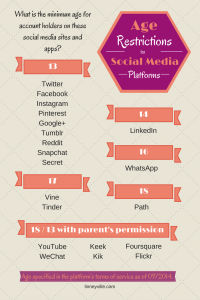
The majority of social media sites have an age requirement that has to be met in order to use them. While some have an older age requirement, thirteen is the most common age restriction for social media sites and/or apps. (Bennett) This is due to the Children’s Online Privacy Protection Rule (COPPA). The Federal Trade Commission website explains this rule as follows: “COPPA imposes certain requirements on operators of websites or online services directed to children under 13 years of age, and on operators of other websites or online services that have actual knowledge that they are collecting personal information online from a child under 13 years of age.” (COPPA) COPPA is a rule that is trying to protect the privacy of those 13 years of age and younger. This rule prevents personal information about children in this age range from being obtained. This personal information includes, but is not limited to, things like their first and last name, their address, contact information, and even information about their parents or others that they may associate with. Just because there is this rule that does not mean that it is always followed.
Although there are these age restrictions, most of these sites have no legitimate way of enforcing an age restriction of thirteen and older only users. Users can easily lie about their age in order to create a profile. As of February 2015 in the United States, Facebook is the most popular social media used by teens and young adults between the ages 12 and 24 years old.(Children’s Privacy) Another study found that “52% of 8-16 year olds ignored Facebook’s age limitation” and lied about their age to make a profile. What is more shocking is that of these children 13 and younger, 68% of their parents helped them create Facebook profiles. (Magid) While this is perfectly fine, parents and their children need to understand what the outcomes of this decision are. Not only are the children now no longer covered by COPPA, they are now also beginning to create a digital footprint. If parents make the decision to allow their children who are 13 years old and younger to have social media, they need to educate them on the risks of different behaviors online and monitor them to make sure they are taking these risks seriously. I believe that there are two courses of action that could be taken by parents to make educate and monitor their children.
Social media has become a big part of society over the years, and I do feel that children under 13 should be able to be a part of this, but parents should take the time to talk to their children about protecting their personal information online and what is appropriate behavior online. One of the primary topics parents should discuss with their children is that what they post online is permanent. Whether they delete the post later on or not, what they post is an everlasting representation of who they are, and that it can (and probably will) be seen by their future employers. Now I know at the age of 13 and younger these children are most likely not thinking that far ahead into the future, but it is never too early to instill this concept into them. There are numerous times I have seen things I posted in my teens that I am so embarrassed about, and I would hate for my future employers to see such things. Not only things that I posted, but how my friends and I publicly spoke to each other in a way that was inappropriate or disrespectful towards others. For example, when I was younger, for some insane reason my friends and I thought it was okay to call each other bitch. Looking back now, I can see how this is totally inappropriate and can make me look bad. Parents should take into consideration talking to their children about the impression they can give off with what they post. My parents never took the time to have this talk with me, and I feel as though if they did maybe I would have thought more seriously about the things I posted and the effects they could have on me later on in life. Parents can also take the time to educate their children how to change their privacy settings on Facebook, so their information is not as easily accessible.
Facebook has different privacy settings that its users can have. Parents should take the time to go over these different settings with their children, and explain to them why it is so important to keep information safe. Children 13 and under should have all of their settings on Facebook set to where only users they are friends with can view their profile and what they post on it. Most children do not know or understand the risks that they take when they give out too much personal information on their social media. One study found that ‘43% had messaged strangers, starting from an average age of 12’. (Reporter) This is a major red flag. What are these children talking to these strangers about? Could they be giving out private information to the strangers that they think is fine to share? To prevent this from happening parents need to discuss with their children what information should not be shared online. They need to help their children understand that once they put that private information out there they can never take it back. Parents can also take this a step further by monitoring their child’s Facebook.
A child’s Facebook could be extremely monitored or just slightly monitored. If a parent wants to slightly monitor the Facebook profile, they can simply just be friends with their child and express concern to their child if something they have posted is dangerous to their privacy. On the other end of the spectrum, parents can take drastic measures to monitor their child’s Facebook profile. Internet filters, such as Net Nanny, can be used to block social media sites and can give parents access their child’s friend-related activities. (Gruenewald) Some of these filters can also be used to set time limits on how long a child is on their social media sites. They can also give parents the ability to monitor the pictures and videos a child is posting online. Some parents also use the approach of having access to their child’s password to monitor their social media use. By doing so, the parents will have complete access to all the activity their child has on their profile. This could help prevent the sharing of private information, or at least make the parents aware if this kind of information has been given out through messages that cannot be seen on the child’s page itself. No matter which method parents choose to monitor social media usage, there should always be communication about social media with their children who use it.
As stated earlier, some children do not realize the risks of giving personal information out to strangers. Parents need to communicate this to their children, and make them aware of the dangers. Parents should also discuss with their children what behavior is appropriate and inappropriate for other Facebook users to use towards them. Having open conversations with your children and making them feel comfortable with being open and honest with you about their online life is important. A child psychologist, Dr. Richard Woolfson says, “Parents need to maintain an open dialogue and encourage children to share both good and bad online experiences, and make sure they keep up with the latest social media crazes and work with their children rather than trying to control them.” Parents can use this as an opportunity to build trust and a stronger relationship with their child. If the child knows their parent are looking to be there for them and help them when something is making them feel uncomfortable, then they are more likely to confide in their parents about the issue. Not only should parents be interested in bad situations their children could come across on Facebook, they should be equally interested in the good things that happen as well. This will show their children that they not only care about their safety, but that they also care about their interests and feelings as well.
Despite these facts, there are some parents who want their children 13 and under to have nothing to do with social media. Some parents are worried their children will be a victim of cyber bullying, or may even be the ones doing the cyber bullying. While there are tragic and fatal cases of underage children cyber bullying other children, this does not mean children should not be on social media altogether. Diana Graber expresses her concern for this matter in her article on huffingtonpost.com. She talks about the case of Rebecca Ann Sedwick. Sedwick was a “12 year old who jumped to her death after enduring a year of cyber bullying from two girls, ages 12 and 14”. (Graber) Graber is concerned that the fact that the victim and one of the two perpetrators were not of the minimum age required to be using the social media sites that the bullying was taking place on (Facebook, Ask.fm, Kik, and Instagram). She also expresses how she feels it is inappropriate for parents to be giving their consent to these children disregarding the minimum age requirement and allowing their children to lie about their age to make a profile. She states how not lying is an implicit agreement we all make in living in a civilized society and that she does not agree with the fact that “as a society we have largely given up, giving age restrictions a collective shrug and “so what?””. As much as I agree that lying is not the best thing, it is not the end of the world nor does it make us an uncivilized society. Parents just need to make sure that they are educating their children on how wrong cyber bullying is and of all of the different negative outcomes that cyber bullying can have.
Other parents are worried that by using social media their children will become drowned in it and develop an addiction to the social media and shut out the outside world. This is another reason why parents should simply just monitor their child’s social media usage. They could also use program Net Nanny that was discussed previously. Parents can set the amount of time their children can be on their social media to make sure that it isn’t taking over their life. It would also be helpful though if parents understood that the use of social media is inevitable. Their children are just simply adapting to the advancements in the world around them. Amy Jo Martin also says, “Parents [and educators] need to think long term and recognize that their kids are building a personal brand from an early age.” She continues by discussing how their children’s digital footprint is going to have an impact on so many different aspects of their life. She says that, “Social media will help connect them with like-minded individuals, including mentors, that share similar interests and aspirations that can help them achieve their long-term goals”. Amy Jo Martin also makes another extremely valid point when she jumps forward to when these underage children are applying to college and jobs. If these children have been taught how to use social media to its full potential and to their advantage by their parents, then they could have ‘proactively been connecting with future professors, industry leaders, and executives at companies’ to get a head start on their future. Martin explains, “They’ve already built a network of people who they are sharing valuable content with, allowing their strengths to shine”. If parents proactively educate their children about how to properly use social media, then it can be a great advantage for them in the future. Just take Martin’s advice and follow these steps to do this successfully: “Sit down with your kids and ask them what they know [about social media]. Do an informal assessment and study their proficiency. Hop on the computer and mobile phone to evaluate their proficiency and better understand what they know. Then, after you’ve educated yourself, educate your children.”
References
“Children’s Privacy.” Children’s Privacy. Web. 08 Jan. 2016.
“Complying with COPPA: Frequently Asked Questions.” Complying with COPPA: Frequently Asked Questions. 20 Mar. 2015. Web. 08 Jan. 2016.
“Most Popular Social Media with U.S. Teens 2015 | Statistic.” Statista. Web. 08 Jan. 2016.
Gruenewald, Nathan. “The Importance of Social Media Age Restrictions.” The Importance of Social Media Age Restrictions. 27 Jan. 2015. Web. 08 Jan. 2016.
“Children and Social Networking Sites.” Netmums. Web. 08 Jan. 2016.
Bennett, Shea. “Minimum Age Requirements: Twitter, Facebook, Instagram, Snapchat, WhatsApp, Secret [INFOGRAPHIC].” SocialTimes. 29 Sept. 2014. Web. 08 Jan. 2016.
Boyd, Danah. “Why Parents Help Their Children Lie to Facebook about Age: Unintended Consequences of the ‘Children’s Online Privacy Protection Act’ | Boyd | First Monday.” Why Parents Help Their Children Lie to Facebook about Age: Unintended Consequences of the ‘Children’s Online Privacy Protection Act’ | Boyd | First Monday. 21 Nov. 2011. Web. 08 Jan. 2016.
Graber, Diana. “3 Reasons Why Social Media Age Restrictions Matter.” The Huffington Post. TheHuffingtonPost.com, 08 Oct. 2014. Web. 08 Jan. 2016.
Grasz, Jennifer. “Number of Employers Passing on Applicants Due to Social Media Posts Continues to Rise, According to New CareerBuilder Survey.” U.S. Job Growth Expected to Hold Steady in the New Year, CareerBuilder’s Annual Job Forecast Finds – CareerBuilder. 26 June 2014. Web. 08 Jan. 2016.
Gross, Doug. “Social Networks and Kids: How Young Is Too Young?” CNN. Cable News Network, 03 Nov. 2009. Web. 08 Jan. 2016.
Madden, Mary, Sandra Cortesi, Urs Gasser, Amanda Lenhart, and Maeve Duggan. “Parents, Teens, and Online Privacy.” Pew Research Center Internet Science Tech RSS. 20 Nov. 2012. Web. 08 Jan. 2016.
Magid, Larry. “Letting Children Under 13 On Facebook Could Make Them Safer.” Forbes. Forbes Magazine, 04 June 2012. Web. 08 Jan. 2016.
Martin, Amy Jo. “The Truth About Kids And Social Media.” Fast Company. 24 May 2013. Web. 13 Jan. 2016.
Reporter, Daily Mail. “More than Half of Children Use Social Media by the Age of 10: Facebook Is Most Popular Site That Youngsters Join.” Mail Online. Associated Newspapers, 5 Feb. 2014. Web. 08 Jan. 2016.
Sengupta, Somini. “For Children, a Lie on Facebook Has Consequences, Study Finds.” Bits For Children a Lie on Facebook Has Consequences Study Finds Comments. 28 Nov. 2012. Web. 08 Jan. 2016.
Williams, Rhiannon. “Children Using Social Networks Underage ‘exposes Them to Danger'” The Telegraph. Telegraph Media Group, 06 Feb. 2014. Web. 08 Jan. 2016.


